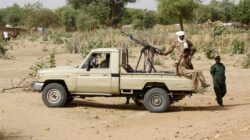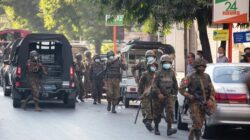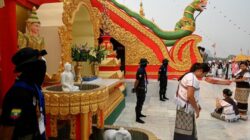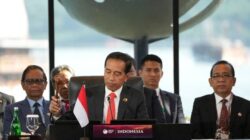SINGAPORE: According to observers, Myanmar’s new gun ownership legislation, which allows citizens to own arms, risks escalating the country’s conflict.
Since the military took power in a coup more than two years ago, the country has been wracked by bloodshed.
The move could empower pro-junta elements, and any carnage could stymie much needed relief work in the aftermath of Cyclone Mocha, which hit western Myanmar on May 14.
Last month’s amendments to weapons rules come as the army confronts increasing pressure to crush opposition on many fronts.
According to observers, the measure is intended to bolster the firepower of junta loyalists who are afraid of being assaulted.
According to experts, the new weapons laws indicate that the junta is under pressure to maintain control.
The military has never had to battle on many fronts, according to Mr Aaron Connelly, senior fellow of Southeast Asian Politics and Foreign Policy at the International Institute for Strategic Studies.
“These new gun laws appear to be an attempt to create a legal mechanism to arm people who support the junta in order to defend areas retaken from the PDF (People’s Defence Force) or local defense forces,” he told CNA.
According to experts, the new weapons laws indicate that the junta is under pressure to maintain control.
Ms Moe Thuzar, senior fellow and coordinator of the ISEAS – Yusof Ishak Institute’s Myanmar Studies Programme, said there are still problems about who needs to use guns in the country.
“When we look back at past practice (and) precedents, we see that the people who were holding arms were either very close to or connected to the military authorities, or people who were military personnel or ex-military personnel, veterans, and so on,” she said.
The new policy adds another layer of anxiety to the lives of people. Many people claim that there is no rule of law and that they feel frightened even when going to the market.
Even before the new gun law was enacted, there were occasional attacks and assassinations on junta sympathizers.
In April of this year, an urban guerrilla group claimed responsibility for the assassination of an election official in Yangon. He testified in the election fraud lawsuit involving former leader Aung San Suu Kyi.
A 58-year-old celebrity renowned for her fervent support of the Myanmar army was gunned murdered near her house in Yangon last month.
Some commercial building and store owners are also concerned, claiming that they are still figuring out the necessary security measures and safety protocols because they have never had to deal with guns on their premises.
Meanwhile, inhabitants of Myanmar continue to endure the brunt of the effects of Cyclone Mocha, the country’s biggest natural disaster since Cyclone Nargis in 2008.
According to experts, there is a concern of politicians interfering as victims seek to reconstruct their lives with international aid.
The reigning military government’s response was already inadequate, admitting international aid into the country only after the critical first weeks, hampering relief efforts.
According to Ms Moe Thuzar, the junta has determined “how the ASEAN space for humanitarian assistance could be used, maneuvered (and) leveraged.”
According to Mr Connelly, one important distinction between the assistance response to cyclones Nargis and Mocha is that this year’s storm struck a region that is not totally under the control of the governing State Administration Council (SAC).
“This is a more complicated situation because the Arakan Army or its political arm, the ULA (United League of Arakan), controls much of Rakhine State,” he explained.
The Arakan Army is an armed ethnic group that has ousted the military junta from much of Rakhine State.
The Cyclone Mocha-affected area is not totally under the control of the ruling State Administration Council.
Some believed that a truce in Rakhine State would put an end to the bloodshed while relief operations were implemented.
Mr Connelly, on the other hand, stated that even when floods occurred in the cities of Sagaing and Magway, the SAC carried out more attacks in those areas.
Resistance forces have also increased their offensives against the Myanmar army in the aftermath of the cyclone.
As aid from ASEAN and the UN begins to enter the nation, there are fears that it will be politicized, with assistance going exclusively to individuals chosen by Myanmar’s military.
The junta also passed legislation late last year mandating the registration of non-governmental organizations.
Some fear that the military will exploit the law to crush its opponents.










